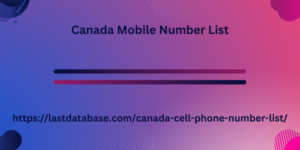Prescription). By virtue of what was stated in advance - and which derives from article of the LGS - the following question arises: can the Administration after the declaration of expiration continue with the pending actions and issue a resolution demanding the reimbursement of the subsidy ? to the obligatory? From the literal reading of this provision, it could be inferred that, even in cases in which the expiration occurs, the Administration would be empowered to continue with the pending actions and issue a resolution that could lead to the reimbursement of the subsidy. However, this would imply a violation of the rights of the administrator, since the expiration of the procedure occurs, in this specific case.
The right of the Administration to resolve within the time conferred by the law, therefore which, would have to start a reinstatement procedure again - and ensuring that it Canada Mobile Number List had not expired - since, otherwise, the legal concept of expiration would be distorted and the resolution of the procedure would result in nullity for not being carried out. carried out within the framework of validity that the law confers [See Supreme Court Ruling dated March , (RJ/)]. The prescription of reimbursement of the subsidy The right of the Administration to contemplate or satisfy the reimbursement will expire after four years: From the moment the deadline for presenting the justification by the beneficiary or collaborating entity expires. From the moment of granting, when they are granted based on the convergence of a specific condition in the beneficiary, no demonstration is required other than the accreditation of said condition by any means admissible in law.

The moment the period established to maintain conditions or obligations to be fulfilled for a specific time by the beneficiary or collaborating entity expired. However, this calculation will be interrupted: When with explicit knowledge of the beneficiary or the collaborating entity, the Administration carries out any type of action with the intention of establishing the concurrence of any of the causes of reimbursement. When resources of any kind are filed - as well as the actions carried out in the course of these by the obligated party -, derived from the act of communication by the administrative body to the criminal jurisdiction by virtue of its knowledge of a fact constituting a crime or for filing a complaint with the Public Prosecutor's Office. When there is some obvious action on the part of the obligor aimed at paying off the subsidy or reimbursement.